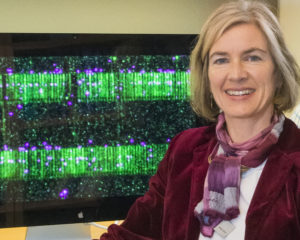JGI’s connection to the 2020 Nobel Prize in Chemistry.
Congratulations to Jennifer Doudna of the University of California (UC), Berkeley and Lawrence Berkeley National Laboratory – jointly awarded the Nobel Prize in Chemistry with Emmanuelle Charpentier of the Max Planck Institute! This is the first science Nobel awarded to two women, with Charpentier and Doudna bringing the total number of women to receive a Nobel Prize in Chemistry to seven.
Doudna was recognized for her work on CRISPR-Cas9, technology described by the Nobel Foundation as having “a revolutionary impact on the life sciences.” Building upon CRISPR-Cas9 work, the Doudna lab at UC Berkeley seeks other enzymes in the CRISPR-Cas system. For the past few years they have partnered with JGI’s Microbiome Data Science group led by Nikos Kyrpides, mining the Integrated Microbial Genomics & Microbiomes (IMG/M) system’s immense collection of publicly accessible metagenomic datasets from a wide variety of ecosystems around the world, conducting iterative searches using statistical analyses to continuously refine and improve the process of finding novel Cas genes and CRISPR systems. The collaboration has resulted in several papers, including one in 2018 on the discovery of miniature CRISPR-associated proteins that can target single-stranded DNA. Such proteins have been adapted for therapeutic application development by Mammoth Biosciences, one of several companies that Doudna has founded.
Doudna’s interest in CRISPRs began with a conversation from another UC Berkeley colleague, longtime JGI collaborator Jill Banfield.
“It was 2006, and I was sitting in my office on the seventh floor of Stanley Hall at the University of California, Berkeley, when the phone rang. On the line was Jillian Banfield, a fellow Berkeley professor from the Departments of Earth and Planetary Science and Environmental Science, Policy, and Management.”
So begins a passage from Doudna’s book about her meeting with Banfield. (Banfield’s recounting of that first – and subsequent – meetings is here.) Working with the JGI, Banfield is a pioneer in metagenomic studies, recovering microbial genomes from biofilm samples at the Richmond Mine in Iron Mountain, CA. Banfield’s observations of the CRISPRs in her microbial sequences piqued Doudna’s interest. As Doudna noted in her book, “These bits of information sent a little shiver of intrigue down my spine; if CRISPR was present in so many different species, there was a good chance that nature was using it to do something important.”
Relevant Links:
- Berkeley Lab publicity.
- Video of the National Energy Research Scientific Computing Center (NERSC) and the DOE Joint Genome Institute (JGI) combining forces with UC Berkeley to seek elusive gene-editing proteins.
- A scoutRNA Is Required for Some Type V CRISPR-Cas Systems. Mol Cell. 2020 Aug 6;79(3):416-424.e5. doi: 10.1016/j.molcel.2020.06.022.
- Wright AV et al. A Functional Mini-Integrase in a Two-Protein-type V-C CRISPR System. Mol Cell. 2019 Feb 21;73(4):727-737.e3. doi: 10.1016/j.molcel.2018.12.015.
- Harrington LB et al. Programmed DNA destruction by miniature CRISPR-Cas14 enzymes. Science. 2018 Nov 16;362(6416):839-842. doi: 10.1126/science.aav4294.
- Harrington LB et al. A thermostable Cas9 with increased lifetime in human plasma. Nat Commun. 2017 Nov 10;8(1):1424. doi: 10.1038/s41467-017-01408-4.
- Tyson GW et al. Community structure and metabolism through reconstruction of microbial genomes from the environment. Nature. 2004. 428, 37–43 (2004). doi:10.1038/nature02340
